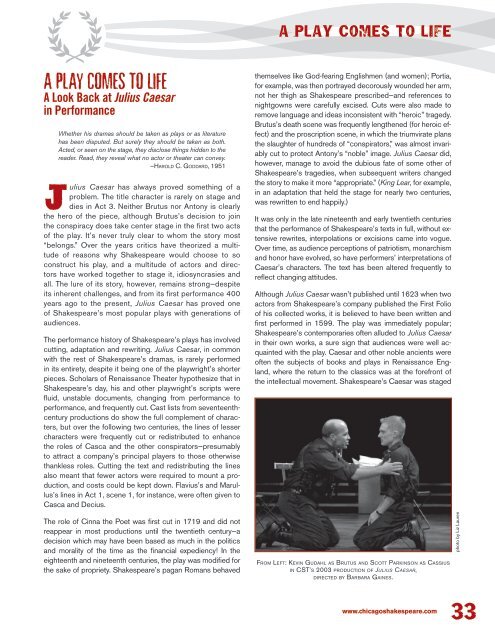Julius Caesar • 2013 - Chicago Shakespeare Theater
Julius Caesar • 2013 - Chicago Shakespeare Theater
Julius Caesar • 2013 - Chicago Shakespeare Theater
You also want an ePaper? Increase the reach of your titles
YUMPU automatically turns print PDFs into web optimized ePapers that Google loves.
A PLAY COMES TO LIFE<br />
A Look Back at <strong>Julius</strong> <strong>Caesar</strong><br />
in Performance<br />
Whether his dramas should be taken as plays or as literature<br />
has been disputed. But surely they should be taken as both.<br />
Acted, or seen on the stage, they disclose things hidden to the<br />
reader. Read, they reveal what no actor or theater can convey.<br />
—harolD C. GoDDarD, 1951<br />
<strong>Julius</strong> <strong>Caesar</strong> has always proved something of a<br />
problem. The title character is rarely on stage and<br />
dies in Act 3. Neither Brutus nor Antony is clearly<br />
the hero of the piece, although Brutus’s decision to join<br />
the conspiracy does take center stage in the first two acts<br />
of the play. It’s never truly clear to whom the story most<br />
“belongs.” Over the years critics have theorized a multitude<br />
of reasons why <strong>Shakespeare</strong> would choose to so<br />
construct his play, and a multitude of actors and directors<br />
have worked together to stage it, idiosyncrasies and<br />
all. The lure of its story, however, remains strong—despite<br />
its inherent challenges, and from its first performance 400<br />
years ago to the present, <strong>Julius</strong> <strong>Caesar</strong> has proved one<br />
of <strong>Shakespeare</strong>’s most popular plays with generations of<br />
audiences.<br />
The performance history of <strong>Shakespeare</strong>’s plays has involved<br />
cutting, adaptation and rewriting. <strong>Julius</strong> <strong>Caesar</strong>, in common<br />
with the rest of <strong>Shakespeare</strong>’s dramas, is rarely performed<br />
in its entirety, despite it being one of the playwright’s shorter<br />
pieces. Scholars of Renaissance <strong>Theater</strong> hypothesize that in<br />
<strong>Shakespeare</strong>’s day, his and other playwright’s scripts were<br />
fluid, unstable documents, changing from performance to<br />
performance, and frequently cut. Cast lists from seventeenthcentury<br />
productions do show the full complement of characters,<br />
but over the following two centuries, the lines of lesser<br />
characters were frequently cut or redistributed to enhance<br />
the roles of Casca and the other conspirators—presumably<br />
to attract a company’s principal players to those otherwise<br />
thankless roles. Cutting the text and redistributing the lines<br />
also meant that fewer actors were required to mount a production,<br />
and costs could be kept down. Flavius’s and Marullus’s<br />
lines in Act 1, scene 1, for instance, were often given to<br />
Casca and Decius.<br />
The role of Cinna the Poet was first cut in 1719 and did not<br />
reappear in most productions until the twentieth century—a<br />
decision which may have been based as much in the politics<br />
and morality of the time as the financial expediency! In the<br />
eighteenth and nineteenth centuries, the play was modified for<br />
the sake of propriety. <strong>Shakespeare</strong>’s pagan Romans behaved<br />
A PLAY COMES TO LIFE<br />
themselves like God-fearing Englishmen (and women); Portia,<br />
for example, was then portrayed decorously wounded her arm,<br />
not her thigh as <strong>Shakespeare</strong> prescribed—and references to<br />
nightgowns were carefully excised. Cuts were also made to<br />
remove language and ideas inconsistent with “heroic” tragedy.<br />
Brutus’s death scene was frequently lengthened (for heroic effect)<br />
and the proscription scene, in which the triumvirate plans<br />
the slaughter of hundreds of “conspirators,” was almost invariably<br />
cut to protect Antony’s “noble” image. <strong>Julius</strong> <strong>Caesar</strong> did,<br />
however, manage to avoid the dubious fate of some other of<br />
<strong>Shakespeare</strong>’s tragedies, when subsequent writers changed<br />
the story to make it more “appropriate.” (King Lear, for example,<br />
in an adaptation that held the stage for nearly two centuries,<br />
was rewritten to end happily.)<br />
It was only in the late nineteenth and early twentieth centuries<br />
that the performance of <strong>Shakespeare</strong>’s texts in full, without extensive<br />
rewrites, interpolations or excisions came into vogue.<br />
Over time, as audience perceptions of patriotism, monarchism<br />
and honor have evolved, so have performers’ interpretations of<br />
<strong>Caesar</strong>’s characters. The text has been altered frequently to<br />
reflect changing attitudes.<br />
Although <strong>Julius</strong> <strong>Caesar</strong> wasn’t published until 1623 when two<br />
actors from <strong>Shakespeare</strong>’s company published the First Folio<br />
of his collected works, it is believed to have been written and<br />
first performed in 1599. The play was immediately popular;<br />
<strong>Shakespeare</strong>’s contemporaries often alluded to <strong>Julius</strong> <strong>Caesar</strong><br />
in their own works, a sure sign that audiences were well acquainted<br />
with the play. <strong>Caesar</strong> and other noble ancients were<br />
often the subjects of books and plays in Renaissance England,<br />
where the return to the classics was at the forefront of<br />
the intellectual movement. <strong>Shakespeare</strong>’s <strong>Caesar</strong> was staged<br />
From leFT: kevin GuDahl as BruTus anD sCoTT parkinson as Cassius<br />
in CsT’s 2003 proDuCTion oF <strong>Julius</strong> <strong>Caesar</strong>,<br />
DireCTeD By BarBara Gaines.<br />
photo by Liz Lauren<br />
www chicagoshakespeare com 33




